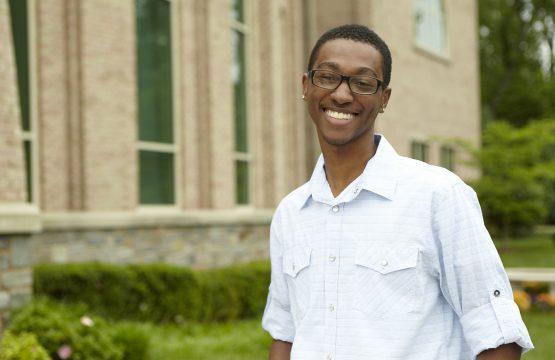Scholar Voices: Fighting to end campus racism
Earl Woods Scholar and Boston College sophomore Felix Lee writes in to our college voices series this month offering a very real glimpse at the current racial tensions affecting students of color on many college campuses across the U.S. Lee chronicles his own experience partaking in “Blackout,” a peaceful protest at Boston College and explains how his involvement with the movement has shaped him for the better and awakened his desire to continue the fight for social justice.
A significant experience that impacted me during my freshman year at Boston College was “Blackout,” an event organized by students of color on campus. The purpose was to stand in solidarity with the students of color at the University of Missouri (Mizzou), where incidents of racial discrimination were escalating. It was a platform meant to address the issue of racism on college campuses throughout the nation. I had no prior experience with protests or rallies, so I did not know what to expect. I did not truly understand the meaning of my actions, but it felt like the right thing to do. The moment I joined the crowd that had gathered in front of the library lawn, I noticed I was one of the few people of color who was not black. This did not bother me because I felt like I belonged. I believed the fight against racism transcended superficial barriers like the color of one’s skin. I believed I was advocating for justice.
Hours after the event concluded, a chain of anonymous messages ridiculing the validity of the event appeared on social media. The messages claimed the event was a “waste of time.” They claimed that racism was not an issue, and the purpose of the event was to seek attention. They claimed that people of color should be grateful for their opportunity to attend a university like Boston College. These messages irked and angered me. Who were these people to judge? Who gave them the right to devalue our experiences? This was the first time I have encountered such ignorance and it motivated me to better understand the social justice issue of racism.
Before I attended Boston College, I did not really comprehend racism. I knew from the history textbooks that I read; racism dealt with the enslavement and ill-treatment of the black community. While I understood the historical context of racism, I had never experienced it. For the majority of my life, I have lived in a predominately Asian community. I attended predominately Asian schools and surrounded myself with friends who were Asian. Only after witnessing the reactions to “Blackout,” did I see the prevalence of racism.
Attending “Blackout” made me cognizant of my words and actions. While I meant no harm, I realized certain habits like jokingly displaying hand signs or speaking in a “gangsta” dialect were extremely hurtful. I recognized that I was perpetuating the stereotype that all black people were thugs, which only marginalized the black community further. In hopes of learning more, I began to engage my friends and classmates on the topic of racism. I listened to their stories and tried to understand their experiences. I sympathized with their encounters with racism because it was important for me to show solidarity and to be an ally for justice.
“Blackout” was an impactful moment for me because I became aware of a societal problem. At the same time, I also discovered my desire to fight for social justice. The first step in the fight against racism is to change one’s self. Fighting for justice is an enormous task but it is not impossible. I believe it begins with self-improvement.
Champions of the unexpected for 20 years.


